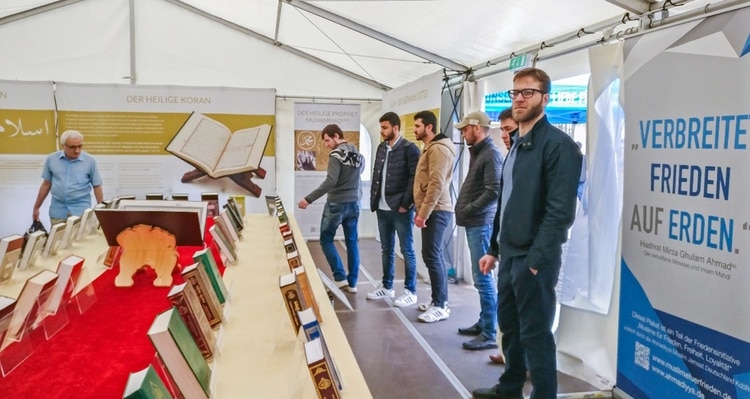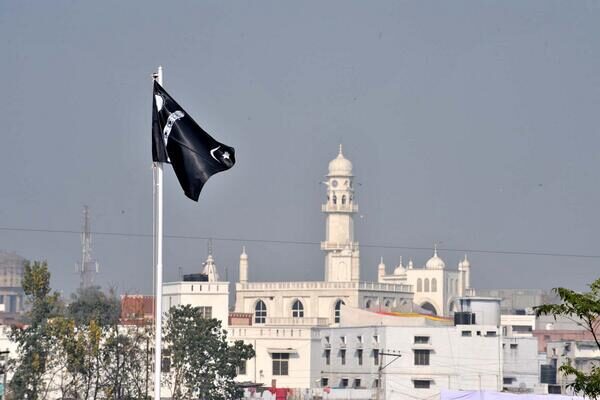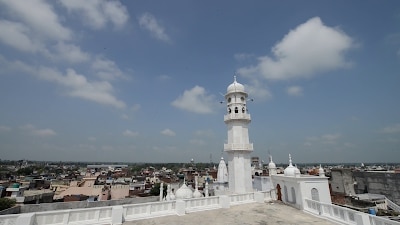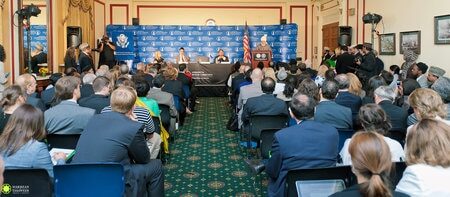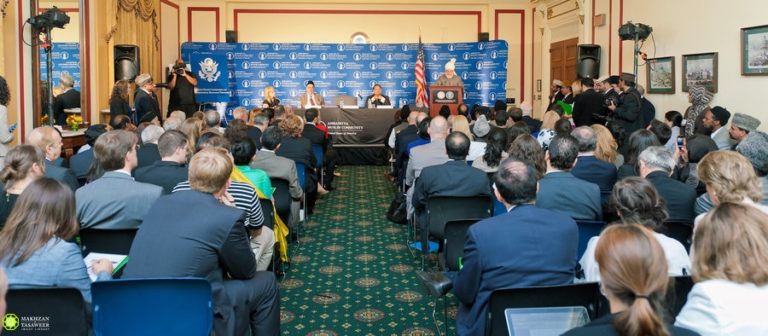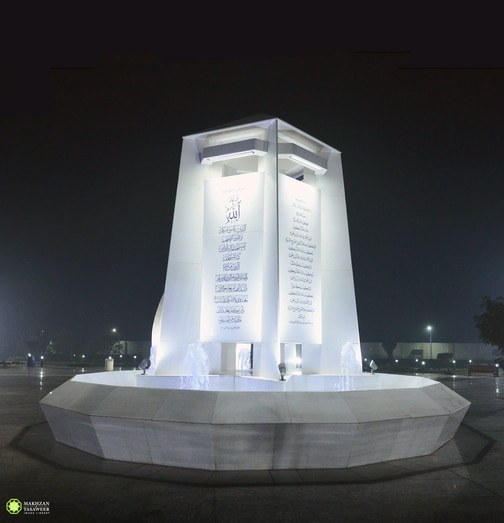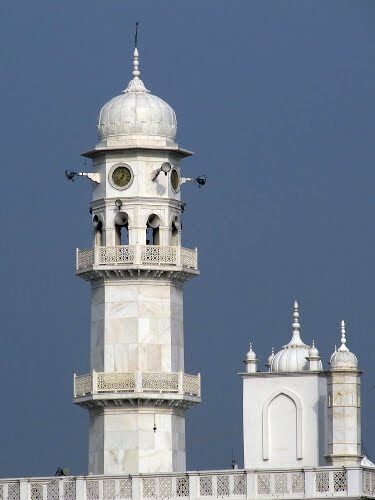Friday Sermon
27 April 2018
The Beloved Muhammad Osman Chou (Chini Sahib)
After reciting the Tashahhud, Ta‘awuz, and Surah Al-Fatihah, Hazrat Khalifatul Masih Vaa stated:
A few days ago, a revered member and scholar of the Community, Respected Osman Chini Sahib passed away. Innaa Lillah Wa Innaa Ilaihi Raji’oon [Surely, to Allah we belong and to Him shall we return].
Allah the Almighty through His special decree, brought him to Pakistan from a remote part of China and enabled him to accept Ahmadiyyat. His own writings are available and he has written his own memoirs in which he has shed ample light on his relationship with God Almighty, how He guided him towards accepting Ahmadiyyat, acquiring religious knowledge and subsequently dedicating his life. Now is not the time to give a detailed account of this. Even some of the incidents, which he narrated to various people, and some of the things, which people have written about him and sent to me are written in great detail. It is not possible to give a detailed account of them or to present them in their entirety. These are very faith inspiring incidents. There is so much information about his circumstances, his life, his services and his character, that one could compile a book. In my opinion, Majlis Khuddamul Ahmadiyya Pakistan could fulfil this task in a more befitting manner.
Nevertheless, at present, I will speak briefly about the aforementioned dervish-like individual, who was a revered member of the Community, life-devotee, missionary and a scholar; one who practiced what he preached and was a waliullah [friend of Allah]. He is a role model for life-devotees and missionaries in particular and for every Ahmadi in general.
I will speak briefly on what various people have written about his life and character later on. Although Osman Chini Sahib was known as “Osman Chini”, his full name was Mohammed Osman Chung Sai Chou. He passed away on 13 April 2018. He was born into a Muslim family on 13 December 1925, in the Chinese province of Anhui. Upon finishing High School in 1946 he completed a year of advanced studies at the Nanchang University before pursuing a degree in Politics at the Nanchang National Central University.
As he had no interest in politics, he considered studying philosophy of law or religious studies. At first, he says that he intended to study in Turkey. However he came to Pakistan in 1949. Having conducted personal research, he performed the Bai’at [Oath of Initiation] and joined Jamia Ahmadiyya. In April 1957 he passed the Shahadatul Ajanib examination from Jamia Ahmadiyya. This used to be an abridged course for missionaries. He dedicated his life on 16 August 1959 and his first appointment was in January 1960. In order to complete the Missionary Training course, he once again enrolled in Jamia Ahmadiyya in April 1961 and graduated in 1964 having obtained the Shahid degree.
He had the opportunity to serve in Pakistan in Wakalat-e-Tasneef, Tehrik-e-Jadid, Rabwah as a life-devotee and also served as a missionary in Karachi and Rabwah. He had the opportunity to serve in Singapore and in Malaysia in 1966. He remained in Singapore for approximately three and a half years and spent almost four months in Malaysia. He returned to Pakistan in 1970 and served as a missionary in various places. He also had the honour of performing the Umrah and Hajj to the House of Allah.
After the migration of Hazrat Khalifatul Masih IVrh, various offices were established here in London. With the increased workload, a Chinese desk was formed to work on translations of the literature of the Community. Thereafter, he was called here [to the UK]. He had the opportunity to translate books into Chinese. Among them, the Chinese translation of the Holy Quran is especially worthy of mention. He also wrote books on the doctrines and the teachings of the Community. He is survived by his wife, a son and two daughters.
With regards to the translation of the Holy Quran in Chinese, in accordance with the guidance of Hazrat Khalifatul Masih IVrh, he began work on this translation in 1986. In June of the same year, he was called from Pakistan to Britain. Following four years of sustained effort, this translation was completed. Chini Sahib personally writes that the Chinese translation of the Holy Quran demanded a lot of time. Hazrat Khalifatul Masih IVrh had instructed for it to be published on the occasion of marking the centenary of [the establishment of] Ahmadiyyat. He says, “I was very apprehensive for the task to be completed on time. I was in search for individuals, who could assist in improving the standard of the Chinese language as well as those who could assist with its proofreading. This was extremely difficult whilst living in Pakistan or in UK. For instance, if an individual was proficient in the Chinese language, he was unfamiliar with Islamic concepts and terminologies. If he was acquainted with religion, his Chinese was not of an adequate standard. This was a very difficult task.”
Nevertheless, he says, “When the translation was completed, I went to China and Singapore under the instructions of Hazrat Khalifatul Masih IVrh and consulted specialists in the Chinese language in order to improve it. By the grace of God Almighty, a Chinese translation of the Holy Quran was prepared to a high standard.” He personally writes with utmost humility, “This task was impossible for me. This is merely the grace of God Almighty, through which this was made possible.”
He further says that even prior to this, several translations of the Holy Quran in the Chinese language were available and many other translations were added later, which number more than ten. However, the translation of the Ahmadiyya Community holds distinct qualities which cannot be found in any other translation. It contains arguments from the literature of the Jamaat and is thus a masterpiece. When it was published, various linguists from China and other countries praised it saying the translation standard was outstanding and commended it. The translation of the Jamaat is well recognised, and in great demand. Generally speaking, some people complain as well that beliefs of the Jamaat have been included in it or that its commentary has been written according to our beliefs. Nonetheless, on the whole, everyone has deemed the translation to be of a high standard.
There is a professor in China, Lin Song, who has written a book with regards to Chinese translations of the Holy Quran written in the past century. In this book, he has also made a mention of our translation and has discussed the Community’s Chinese translation of the Holy Quran, covering approximately fifteen pages of this book. The professor mentions the distinctions of our translation of the Holy Quran very elaborately. For example, he says that usually when scholars translate, they fail to translate certain words. As a matter of fact, they write the same Arabic word instead of its translation, or they elaborate this in the footnote. It seems, therefore, as if these parts were unclear to them. On the other hand, the distinction of the translation of Osman Sahib is that he translated even those passages and he referred to the supporting references on the basis of the rendered translation in the footnotes.
The professor further writes that having published his comments about this translation, he met Osman Sahib several times. It was his impression (this is the sentiments of a non-Ahmadi, an intellectual professor, who considers himself to be an authority on Islam) that Osman Sahib was a simple, humble, sincere and honest man, who was devoted to following the commandments of God Almighty. He further says that that during one Ramadan, he had invited Osman Sahib to his home. Osman Sahib observed the fasts and considered the Holy Quran to be highest book of religious law. He further writes that even though some parts of Osman Sahib’s translation and commentary are not in accordance with the views of Chinese Muslims who belong to the Sunni sect [of Islam], it is not possible to deny the fact that Osman Sahib was a person who believed in the unity of God, who loved the Holy Prophetsa and obeyed Divine commandments. (Daily Al Fazl, 12 March 2012, p. 3)
The English titles of the Chinese literature that was produced by Chini Sahib under his supervision are as follows: My Life and Ancestry, Introduction to Morality. There are seven books that have been authored by him. Besides these, there are approximately thirty-five books which he translated, or which were translated under his supervision. He wrote An Outline of the Ahmadiyya Muslim Community, which is an introduction to the Jamaat; Outline of Islam, which is an introduction to Islam; Fundamental Questions and Answers About Islam, which comprises of basic questions about Islam; Islamic Concept of Jihad and Ahmadiyya Muslim Community in Chinese; Ahmadiyya Muslim Community’s Contribution to the World. He also wrote about the need for Islam and religion in a person’s life. These are his scholarly achievements, which I have briefly mentioned.
In relation to his domestic life, his wife writes, “When I received the marriage proposal of Osman Sahib from Pakistan, initially my father did not agree due to the age difference.” His wife is also Chinese and says, “I was twenty years old at the time [of the proposal] and Osman Sahib was almost fifty years old. My father did not inform me about this proposal for several months. When he finally told me, he placed the letter before me so that I could decide for myself.”
She then says, “I saw myself in a dream standing in a large field in a foreign country completely empty handed. Suddenly, the thought of what would happen with me crossed my mind. At that moment, I saw a person dressed in white at a distance, and I heard a voice saying that all of my requirements would be fulfilled through this person.” She further says, “After seeing the letter [of the proposal], I saw Osman Sahib in a dream, dressed in white and standing beside me whilst I was laying down. When I was shown a picture of Osman Sahib later on, I realised that this is that very person, whom I saw in the dream. As a result of this, I accepted this proposal. We were engaged for four years.”
She writes that her passport was not being issued and the circumstances were very difficult in China due to the political and Cultural Revolution, it was very difficult for her to leave. She further says, “Osman Sahib saw in a dream that when Mao Zedong passes away, his wife will join him.” At that time, Mao Zedong, who was the chairman of [the communist party of] China, was healthy and well, living a comfortable life. Nevertheless, upon this she said, “The wait seemed to be forever and his death was uncertain. At which, Chini Sahib decided to write a letter to Mao Zedong. Chini Sahib says, ‘I was on my way to post the letter, when I received the news of the demise of Mao Zedong.’”
Chini Sahib’s wife then writes, “A few days following Mao Zedong’s demise, I received my passport. I took my passport and went to my father’s house. When I arrived there, it rained heavily through the night. Prior to this, there was a severe drought. It rained so profusely that as a result of the great flood of water, some of the ground began to erode. A non-Ahmadi neighbour said to me, ‘You ought to have come earlier so this drought would have come to an end.’”
Nonetheless, she says, “After a week, I left China. I did not have much with me. I had two sets of clothes, which were given to me by Osman Sahib’s younger brother, and apart from this, I had a few cubes of soy sauce. I reached Karachi on 12 August 1978. Here, Chaudhry Muhammad Mukhtar Sahib led our Nikah [marriage ceremony] and he was personally appointed as my Wali [guardian]. On the third day, we had to go to the Chinese embassy. We went via train, which had separate compartments for men and women, and we decided to reunite with each other at our desired destination once everyone had disembarked from the train. However, prior to this [reaching the destination], as I was new and as everyone on my carriage had left the train, I also disembarked believing it to be the last station. When the train moved again, I realised [that this was not the last stop]. However, at that time it was difficult to board the train due to the crowd of people. I was extremely worried. However, a police officer saw my distress and he called the railway police. They then sent me to the Chinese embassy.”
She says, “I was wearing a veil and a coat. The people at the embassy could not believe that I was Chinese, as how could a Chinese woman wear a burqa. They took a Chinese magazine and asked me to read it aloud. A taxi was then organised for my transportation”. Nonetheless, it is a lengthy story. Somehow, she arrived at her destination. The taxi driver enquired during the journey as to the destination and eventually took her there. He was also astonished that he had never seen a young woman lost in this manner, only to be found again. She further says, “This was the beginning of our life together”.
Regarding Osman Sahib, she writes, “He was a good husband, in fact he was my spiritual mentor. When I went to Pakistan, he first taught me how to offer the Salat. First, he would lead congregational prayer at the mosque and then come home to lead me in prayers. He would spend hours teaching me the Arabic words of the salat. He taught me [the salat] word by word and line by line. He admonished me that I should keep revising it and keep a book of prayers with me, in case I forgot. He taught me the Qaidah [elementary booklet regarding Arabic used to teach the Quran] over the course of six months. When teaching me the Holy Quran, he also taught me its translation to keep my interest alive. He was a patient man and would explain things in great depth using different examples. He took very good care of his relatives. He called his mother over from China to Pakistan and cared for her.”
Chini Sahib’s wife says those times were difficult and sometimes they could only afford one bottle of milk a day, yet, he would give this bottle to his mother. Whenever he went on a journey, he took his mother along with him. Chini Sahib served his mother very well. She says, “His life was defined by his devotion to his work. When he was in good health, he would work until late in his office and sometimes work through the night until the morning. At home he was most concerned about bringing up his children in a righteous manner. He had no interest in their individual worldly pursuits. He was very simple in his choice of food and clothing.”
His elder daughter, Dr Qurratul-Ain writes, “It is difficult for me to describe certain attributes of my father in words. He was kind, loving, hardworking, tireless, humble and an optimistic person. He would encourage all his children and later his sons-in-law to take part in all discussions. He would take a keen interest in our secular education and would ask what the teachers had said about a particular subject. He would say that the purpose of our lives was to propagate the message of Islam, especially to the Chinese people. He would regularly admonish us to keep increasing in our spirituality, knowledge and good virtues. He would often say that people should begin believing in God merely by looking at our conduct and personality, as children who believe in God are better than those who do not. He would also say that we should be regular in whatever work we undertook. In our childhood he never scolded us, he would always explain things in an affectionate manner. The only time he was strict was in regards to the regularity in Salat. In order to inculcate this habit within us, he would go the mosque for all of the five daily prayers. During school holidays, he would give us books to read and later test us on what we had learnt”. She says, “He once gave us an old copy of Kashti-e-Nuh [Noah’s Ark] and said that we ought to read it as its Urdu language was not as difficult as some of the other Urdu books [of the Promised Messiahas]. He then said that that was the first book that he himself had read whilst he was a student at Jamia Ahmadiyya.”
Chini Sahib was concerned about [his daughters] observing purdah while at university. He had instructed them to observe purdah when they were at university, and if it was essential to take off the veil, it was only to be for the duration of the classes, but then they ought not to be wearing any make-up. He had sought permission from Hazrat Khalifatul Masih IVrh for them to attend university. He granted permission on the condition that they would observe purdah and if the veil needed to be removed, it should only be removed for the duration of the class, and in that case they should not wear any make-up and the veil ought to be worn again immediately afterwards.
Chini Sahib’s younger daughter Munazzah writes, “He would say to us that we should aim for the moon, so that we would at least obtain the stars, i.e. that we should always aim high. Beside the five daily prayers in congregation, he encouraged his children to offer the Tahajjud [pre-dawn voluntary] prayers. He would wake us up for prayers by sprinkling water over us. He would ask us to read the books by the Promised Messiahas and the Khulafa. He would sit with us for hours answering our questions patiently and would not get irritated by insignificant matters.” This is an example for all parents. She then says, “He always said that we should use our faculties given to us by God Almighty and not waste them. He said that whatever we did, we ought to do it with the intention of performing an act of God’s worship. He would say that spiritual progression was like a staircase. There may be some breaks at times, but it would soon be followed by an upward journey.”
She further says, “He always taught us to prefer others over ourselves. During his time as the president of Islamabad [Tilford] Jamaat, once, when central heating was being installed in all houses, he made sure that his house would be the last to be fitted with it.”
Chini Sahib’s son, Dr Daud Sahib writes, “He once told me that when he received a telegram from China informing him of the sad demise of his father and eldest brother, he was about to sit one of his Jamia exams. He remained focused by saying to himself that the sad news just received was a test from God Almighty, in the same way that this Jamia exam was a test, and so he proceeded to sit the exam and did not waste any time.”
His son further writes, “He was very keen to preach to Chinese people. Whenever we used to attend any function, he would introduce Ahmadiyyat to the people and distribute literature. Even when his illness rendered him unable to walk and he had to use the wheelchair, he would insist on having some big books in the compartment of his wheelchair, so that he could distribute this to people.” His son says, “When I was young and would visit my father’s office, if I ever tried to use a pen or pencil from my father’s office, he would not allow me to do so. He would say to my mother, ‘Buy him his own pen as he is in need of one.’ If we ever needed something photocopied, he would instruct us to bring the paper from home and only then use the photocopy machine.”
He further says, “He used to instruct us to learn the attributes of God; and that we should memorise all the names of God that reflect His attributes. He wrote a poem in the Chinese language venerating the hundred attributes of God. He used to recite this poem every night. He also set a competition between us siblings about who could memorise the most attributes of God and would also give a prize for that.”
Perhaps two or three months ago, he came to visit me with his son-in-law and his family. His son-in-law writes, “As he was unable to speak, he wrote down three points of what he wished me to ask. It said, ‘I am very frail now and unable to stand up by myself. This is why I am sitting in the wheelchair. I apologise for this.’”
He had great reverence for Khilafat. “He also said to pray for him that until his last breath, he could continue to preach the message of Islam. He also asked to be permitted to work from home as he was unable to go to the office.” This was his commitment to his work. It was not the case that since he was at home he should sit idle. His desire was to continue to work from home.
When Chini Sahib went for Hajj, his son-in-law was with him. He says, “Osman Sahib wrote a poem in Chinese expressing his sentiments of supplication. Chini Sahib said, ‘I am putting these sentiments in poetic form so that I will be able to benefit from these in the future.’ In our Hajj party, there were some other people who asked respected Osman Chini sahib, about what he was writing? He explained to them in brief, ‘I am praying for my fellow Chinese people, that may God Almighty bestow them guidance towards the true Islam.’ At this, the person who asked the question was rather astonished that this old frail gentleman, who could barely walk without any support was worried for the guidance of his fellow Chinese people.”
Chini Sahib writes in his biography, “In China the teachings of Buddhism, Confucianism and Taoism have all been amalgamated. Many Chinese people follow the teachings of all three of these religions at the same time. However, in this day and age they have mixed these teachings to form a new religion. In this religion a special focus is given to the moral state of an individual.” Chini Sahib then writes, “When my interview was published in three separate Chinese newspapers, the Dasta Society in Malaysia (which is a new religion of deism) also expressed a wish that I should write an article about the moral teachings of Islam. In this way they could publish the moral teachings of Islam along with the teachings of other religions in their magazine.”
Thereafter, Chini Sahib says that he wrote an article and in return, the publishers responded to him by saying, “You have written an exceptional article about the teachings of Islam. We are very grateful for this. You have expressed the true teachings of Islam in an unbiased manner and argued your points in depth in a defined manner. This reflects that you have acquired a high degree of knowledge of religions. People in China do not have full understanding of Islam. The reason for this is that there has been limited preaching of Islam in the Chinese language, and now you have come to Singapore to spread the message of Islam. (This was when he was stationed in Singapore.) It is inevitable that Islam will spread in these countries among the Chinese people and they will gain blessings of this.”
Agha Saifullah Sahib was Chini Sahib’s class fellow, or was a contemporary with him in Jamia. He writes, “Chini Sahib was my class fellow. During the prime of his youth, he was pious, good-natured and had virtuous conduct. He would offer prayer with extreme devotion and would supplicate with immense anguish. He would observe voluntary fasts and was in the habit of offering voluntary prayers. He would occupy himself in the praise and remembrance of God Almighty. He would express extreme gratitude for the blessing of accepting Ahmadiyyat, and would always show great love, dedication and commitment.” He writes, “It is a true testimony that when we were students, at times due to being away from home, he would be overcome with emotion. He would remain quite concerned about seeing his mother and brothers again, about their well-being and about the system of the government in China. Sometimes he would share his pain. He would supplicate to God with extreme dedication, heartfelt pain and anguish, seeking his desired objective from the True Creator.”
He further says, “Even in this old age, those memories are a source of great envy for me, and the truth of the matter is that whatever this humble servant of God supplicated for during the days of extreme trial, God Almighty granted acceptance to his commitment and supplication; and granted him everything because of the blessings of Ahmadiyyat. He was blessed with immense mercy. Indeed, other people also benefited from his acceptance of prayers.”
He then says, “During the days when I was a student, due to the grace of God Almighty, I had the blessed opportunity to enjoy the righteous company of Hazrat Ghulam Rasool Rajeki Sahib, Hazrat Maulvi Abdul Latif Bhawalpuri, Sahibzada Syed Abul Hasan Sahib and other esteemed elders, and had the opportunity to request them for prayers and also witness the impact of acceptance of those prayers.”
Agha Saifullah Sahib then says, “With due diligence and observation, I can bear witness that in terms of the devotion in the acts of worship, fervency in supplication, extreme dedication, commitment and acceptance of prayers, I can see the reflection of these highly revered people in the personage of Chini Sahib.”
He further writes, “I witnessed the acceptance of Chini Sahib’s prayer in many of my personal matters… Chini Sahib always strongly advised me and other people he would meet about prayer and supplication. He was a very wise man who possessed the insight of a believer. He was extremely measured in expressing his opinion regarding the administrative matters of the Community. He would follow the system of the Community impeccably, and always would encourage his friends and acquaintances to do the same. He had a complete bond of spiritual devotion with Khilafat and would express gratitude at its blessings. When anyone made a request for prayers to him, he would always ask whether or not they had requested the Khalifa for prayers?”
Dr Rizwan Sahib, the President of the Islamabad Jamaat writes, “His love and devotion to prayers was such that in his last few years, it would take him several minutes to walk in what was only a few minute journey from his house to the mosque, and he would have to stop a few times to catch his breath. But despite all this I never saw him combining his prayers. Once, when there was only a short time between the Maghrib and Ishaa prayers, I submitted to him saying that instead of going back home he could wait in the mosque until the Ishaa prayer or combine the two. He replied, ‘By walking, I will benefit from exercise and will reap the reward of walking from my house to the mosque, so this is why I will go and come back.’”
Rasheed Bashiruddin Sahib of Abu Dhabi says, “Ahmadis and non-Ahmadis alike would benefit from his prayers. When he was a missionary in Drigh Road, Karachi, non-Ahmadi men and women would go to him for advice regarding their personal matters and testified to how after acting upon Chini Sahib’s advice and requesting for his prayers, their major issues were resolved. In brief, the well-known Chinese Muslim scholar of Drigh Road, Karachi, was a generous and loving person to all, irrespective of their religious background. Even after moving to England he was remembered amongst the non-Ahmadis and was talked about for a long time.”
Rasheed Bashiruddin Sahib further says, “I also witnessed that Chini Sahib would take great care of his mother. At times his mother would scold him when she was displeased, but he would quickly express his love for her. He took care of her needs. He was so absorbed in doing so that he would not take notice of what was going on around him or who was watching. His love and affection for his mother was extraordinary.”
Majianov Muhammad Sahib of the Tokmok Jamaat, Kyrgyzstan writes, “I met Osman Chou Sahib in 1994 on a plane journey. In the beginning I was unaware that he was a Muslim or that he was a scholar of the Ahmadiyya Community, but when the plane was about to take off, he recited Bismillah [In the name of Allah], and then I came to know that he was a Muslim. After a while I said Assalamo Alaikum [greeting of peace] to him and introduced myself. We began to discuss various topics, and then he asked me if I knew of the Ahmadiyya Muslim Community. I answered in the negative and said that I was unfamiliar with them. He then asked me if I had read any Chinese translations of the Holy Quran to which I replied in the affirmative. He then asked of how many Chinese translations of the Holy Quran I was aware of. I said that however many translations there are I have read them all and continue to do so. Osman Chini Sahib then asked if I knew any of the Chinese translators of the Holy Quran. I replied saying that I knew them all. Then he said that one of those translators is named Osman Chou and he asked if I knew him. I answered that I knew him but had not yet read his translation of the Holy Quran, nor had I ever met him. He then said that he was Osman Chou. I could not believe that I was meeting Osman Chou Sahib. He gave me his contact details and his temporary address and I too exchanged my phone number.
“After a day or two, Chini Sahib rang me saying that he wished to come and meet me. I could never have imagined that such a prominent scholar wished to come and meet me at my home. I welcomed him to my home, and with him were two Pakistani friends. We spoke for ten minutes, after which Osman Chou Sahib invited me to a restaurant. I told him that since he was a guest, I ought to be the one to invite him. However, he replied saying that as I was a student and that he was my elder and like a parent to me, therefore he should look out for me. Thereafter we went to the restaurant and had food and discussed different matters. Similarly, one day I went to see him in the Central Bank building and spoke to him where he was staying. He asked me regarding the death of Jesus, Finality of Prophethood, Gog and Magog, Jinn, the Imam Mahdi, the Quran and the Ahadith. I gave him the same conventional answers that the general Muslims give and Osman Chou Sahib smiled and gave the true answers to these questions. I had no words with which to respond and his answers had a profound effect on me. He also gifted me the translation of the Holy Quran and some other books and admonished me to read them and to write to him about my feelings after reading them. Hence I read them and my way of thinking changed completely. At that time I did not know of the Bai’at so I took the oath of allegiance later on.” He also writes, “I always deem it an honour to have gained knowledge of the advent of the Imam Mahdi and his true Jamaat.”
Many people have written incidents about the acceptance of Chini Sahib’s prayers. Manzoor Shad Sahib writes, “On one occasion we were travelling from Rabwah to Karachi via train. There were approximately 60 children with us as there was a Rabwah Atfal programme. On the way we prayed in congregation and the non-Ahmadis realised that we were Ahmadis. The maulvis [religious clerics] began delivering speeches in all the carriages that there should be some action taken against us. We were very worried. Osman Chini Sahib was also with us. Different people were assigned duties in terms of security and Chini Sahib said that he should also be given a duty. I told him that his duty was to sit on the berth and pray. The Maulvi planned to take action and also physically beat us once they had reached Multan. However, we passed Multan and there was an air of silence from the Maulvi. When we went to find out why, we saw that he had fallen asleep. He was meant to disembark at Multan but had slept to the point that he missed the Multan station having not woken up. He then got off at the next station and in this way we were saved.”
Similarly, Adnan Zafar Sahib writes, “My case in the [UK] Home Office was not processing further at all. Many a time I asked about my passport but they said that they did not have any record of me being in the UK. In this way I would take leave from work for 3 to 4 months to go there and in the end I was left in despair. One day I met Chini Sahib in Islamabad. After offering prayers, on his way home, when I mentioned this issue of mine with regards to my passport. He raised his hands to pray there and then. His supplication was so emotional and he was wailing in his prayer so much that I became afraid. I was anxious that he was praying so profusely for me and I have troubled him for no reason. Other people too joined in this prayer. The next day when my lawyer rang the Home Office no one was attending the call. The phone rang for a long time until the Director, who was walking by, came and attended it. The lawyer explained the situation and the Director replied that I should come and meet him in his office in the morning. When I went to the office, I informed the receptionist that I have come to meet Mr Richard (who was the Director). The receptionist said that Mr Richard was a high ranking official hence, why would he wish to meet me, and instead to tell them my situation. I informed them that Mr Richard had himself called me, but no one was willing to inform him. Eventually one person was willing to help and who went to inform the director. Mr Richard himself came out of his office and accompanied me to his room. He looked through all the records on his computer, and then called his secretary, gave her a sheet saying my passport should be issued right away. Thereafter, he accompanied me outside his office. All the workers there were watching this and asking themselves who this important foreigner was for whom the high official had come out of his office and opened the door for him to leave? What could I say, at that time I was in such a state that as a result of the tender prayers of Osman Chini Sahib my issue, which had been suspended for four months was resolved within a day, and on top of that it was done at the hands of the high official.”
There are countless other incidents, all of which cannot be mentioned due to the sheer volume. I shall read out a few from his close friends. Syed Hussain Ahmad Sahib, a missionary writes, “We would have weekly meetings. Missionaries did not own any vehicles so we would take busses. The meetings would go on late into the night. Once finished, we would return with an Amila member from the meeting and wait until they would go. However, Osman Chini Sahib never waited and would either walk back or if he saw a bus or someone else on the way he would go with them. The area where he was staying in the mission house had only a small space. One day he invited us, and we enquired as to where he would stay. He showed us his room and said that that was the women’s prayer hall, and when they came to pray he would gather all his belongings and then return once they were finished. That was where he would sleep, eat and live. He stayed in a very small room with great humility and modesty.”
Rasheed Arshad Sahib worked with him for a very long time in the Chinese Desk. He says, “I had the opportunity to work with him for 33 years and his qualities were such that he was regular in the congregational prayers and completely absorbed in his worship. He was an example for all of us. In rain, snow and storms, he would regularly go to the mosque for congregational prayer. We even saw him in such a condition where, due to old age, he became very frail. (As mentioned previously) When coming from his house in Islamabad to the mosque which was only a few minutes distance away, he would cover that distance in 15 to 20 minutes and would stop regularly to catch his breath. He regularly observed the Tahajjud prayer. Once when we were in China, we travelled a long distance and spoke to the Ahmadis till late. I thought that it would be difficult to wake up for the Tahajjud prayer. Yet in the morning I saw that Chini Sahib was offering the Tahajjud prayer, even if it was brief he would never break his routine.
Chini Sahib himself narrated that when he came to Rabwah from China he witnessed how the elders of Rabwah would pray with great fervency and passion, observe fasts, perform Etikaf [retire to seclusion for spiritual retreat] and make supplications, God Almighty would listen to their supplications. This had a deep impact on him and he vowed that he would also follow in the footsteps of those elders. At that time he had the guidance of Hazrat Khalifatul Masih IIra, as well as the opportunity to sit in the company of great personalities such as Hazrat Mirza Bashir Ahmad Sahibra and Hazrat Mirza Sharif Ahmad Sahibra. He would derive benefit from sitting in the company of Maulana Ghulam Rasool Rajeki Sahib, Hazrat Mukhtar Ahmad Sahib Shahjahanpuri, Hazrat Muhammad Ibrahim Sahib Baqapuri, Syed Waliullah Shah Sahib and others. Through keeping company with these noble elders, God Almighty further polished his character and also increased his relationship with Himself.”
Rasheed Arshad Sahib further writes, “He was extremely passionate in matters of spreading the message of Islam. He had a quiet temperament and would speak less. However, we have seen that when he would be engaged in Tabligh, he would have extraordinary strength and passion which enabled him to talk for hours on end. On many occasions if he would speak on the phone he would not worry for the time, and hours would pass by. He inherited the quality of hospitality for guests. He would often say that his father was very hospitable. His father would say that as there was no hotel in the village, their house was the hotel. Chini Sahib’s wife would also fully support him in matters of hospitality.”
Similarly, he would always care about the sentiments of others, irrespective of how tired he may be. On one occasion a meeting was conducted until late. When they sat in the car, someone requested Chini Sahib to visit their house as it was nearby. Rasheed Arshad Sahib says, “We thought that he would decline, however, he agreed to go. That gentleman had made food arrangements for us. We sat until late and returned approximately at 1am. Chini Sahib did not decline the request of the gentlemen, nor did he say that he has to leave quickly.”
Naseer Ahmad Badr Sahib, who is a missionary, writes, “When I was instructed to learn Chinese, I contacted Chini Sahib. In China, I had ample opportunity to call people toward God in several areas. During those times I benefitted greatly from Chini Sahib’s guidance and direction. He would guide me through letters.” He then says, “I had the opportunity to speak to thousands of Chinese people and also distribute booklets containing the message of the Promised Messiahas.” He further says, “Everywhere I visited, Chini Sahib was spoken highly of and amongst the Muslims in China, he is considered to be an eminent scholar.” He continues by saying, “The literature that he has written will never allow him to be forgotten. The ink that flowed from his pen was an ocean of wealth that he derived and translated from the works of the Promised Messiahas, and then distributed to the masses. His eloquence and articulation of the Chinese language has an attraction which has a captivating effect.”
Naseer Ahmad Badr Sahib then says, “I understood this fact when I went to a Muslim Madrasa in China. When I visited for the first time, they did not prepare anything special and showed little interest in my visit. However, after a short while when I returned again, all the Muslims including the Imam greeted me with a lot of love and affection. I asked from one of the locals that when I visited for the first time I was not shown as much love and affection as is being exhibited on this visit. Upon this the local Chinese gentlemen said, ‘The Chinese books that you gave to our Maulvi Sahib [religious cleric], especially the translation of selected writings of the Promised Messiahas, were such that they are recited in the sermons. Listening to them has an incredible trance-like effect on us. We have never heard such extraordinary writings in our entire lives. We therefore wish that you should bring us more books like this.’”
He then further says, “I had the opportunity to visit Chini Sahib’s ancestral village and met with his family and friends. All of them would speak about Osman Chou Sahib with the utmost love and respect. Every one of them would express great joy in explaining their relation to Osman Chou Sahib.” He further states, “During my stay, all of them took care of me and showed great hospitality simply because I knew Osman Chou Sahib and that I was a representative of the Ahmadiyya Community.” He goes further on to say, “The translation of the Holy Quran by Osman Chou Sahib is very comprehensible and can easily be understood by everyone, but at the same time it articulates the eloquence of the Chinese language. Therefore, although other translations of the Holy Quran in Chinese are available, Osman Chou Sahib’s translation is widely accepted throughout China and is considered an authority. I realised this fact having met with a range of Chinese scholars, who despite holding views that are contrary to the Jamaat’s, yet they value this translation very highly and in order to understand the Holy Quran they use this devotedly.”
He further states, “During my visit of the region I met with an elderly Imam. Seeing a copy of this translation of the Quran in my hand, his face lit up.” He had a copy of Chini Sahib’s translation in his hand. “He was elated to see this translation and repeatedly said, ‘I have been in search of this translation for a long time. Would you be able to give me a copy of it?’. I informed him that at present we only have one copy of the translation, however, if he gave me his address, we would obtain one copy from Osman Chou Sahib. He thought about it and then said, ‘If you permit me to borrow this copy for a short while, I can make a photocopy of it.’ This translation consisted of approximately 1450 pages, and seeing this gentleman’s desire to simply photocopy it, we gave him the copy to keep. He was overjoyed and repeatedly thanked us as if we had given him a piece of priceless treasure.’” Undoubtedly it is a treasure, nevertheless, he was unable to control his emotions of joy.
Similarly he had, and still has, ties with a vast number of people. All the missionaries who have served there have written saying that wherever they would go in China, Chini Sahib was spoken highly of. Zafrullah Sahib, who is a missionary currently stationed in Pakistan has also served in China. He writes, “In 2004 when Chini Sahib visited Pakistan, on the way from Islamabad to Rabwah he took me to Kallar Kahar. This is where he would come for spiritual retreat for 40 days during the time he was a student in Jamia. He narrated one incident of his in which his prayer was accepted. During this seclusion, he visited a couple who had been married for ten years, however they did not have any children. They requested Chini Sahib for prayers in this regard. Chini Sahib prayed for them and saw in a dream that Chaudhry Zafrulla Khan Sahibra was resting on a charpoy [woven bed] in their courtyard. He narrated this dream and gave them glad tidings that God Almighty would grant them a son. Thus, a while later, God Almighty bestowed them with a son.”
I also remember the time when he would go for his seclusion in Kallar Kahar. It was during the time of Hazrat Khalifatul Masih IIra and I was fairly young. On one occasion when I visited the place, he was sitting in a small room with a copy of the Holy Quran in his hands and was reciting prayers. All of us, young and old, then requested him for prayers. He replied with a smile on his face and would always show kindness to everyone.
Dr Noori Sahib writes, “During a check-up in 2004, (fourteen or fifteen years ago) we discovered that he had a heart condition that could not be treated.” He says, “I was very worried because, with the exception of prayer and a few small remedies, there is no treatment for such a condition. The survival chances of such people are severely reduced and they do not live beyond a few years.” Dr Sahib writes, “However, by the grace of Allah, I met Chini Sahib many times, despite his illness and signs of progressive weakness; he never allowed his illness to hinder him from fulfilling his work commitments and would always be occupied in his work.”
He never let his illness prevent him from working, or hindering him from worship. In fact, someone has written, “On one occasion it had snowed heavily. We thought that seeing as it was difficult to even walk due to the snow, nobody would be able to go for Fajr, or at least it would be difficult for Chini Sahib to come to the mosque. Nevertheless, we went to open the mosque. When we were outside we saw footprints in the snow. Inside the mosque we saw that Chini Sahib had not only made his way to the mosque, but in fact he had arrived early and was performing Tahajjud [pre-dawn voluntary] prayers.”
Ataul Mujeeb Rashed Sahib has written about him, which is an accurate summary and is in complete accord with the truth. He writes, “He has left behind a large void. He was a man of lofty character.” He then says, “I was pondering over Chini Sahib’s attributes. Among them was that he was always occupied in worship and had his prayers accepted. He was extremely punctual in offering his prayers. Despite his illness and weakness, he would always go to the mosque. He was a pious, saintly man who did not look to harm anyone. He would always want the best for everyone and would give sound advice to all. He was a simple and honest man. He was very hospitable and would always show great generosity to his guests. He was extremely courageous. Despite his frailty, he was always active in serving the faith. He would discharge his responsibilities with full effort, sincerity and passion. His desire and dedication to serve the faith was extremely evident. He was a humble and a truly loyal servant of Khilafat-e-Ahmadiyya. He would meet everyone unreservedly with a beaming smile as well as possessing countless other qualities.” Whatever has been mentioned here is absolutely true.
May Allah the Almighty continue to elevate the status of respected Osman Chini Sahib, and grant patience and steadfastness to his wife and also become her Helper and Guardian. Furthermore, may God Almighty enable his children to become the recipients of his prayers and virtues, and enable them to follow in his footsteps. After the prayers, I will lead his funeral prayer, Insha-Allah [God Willing].
(Translated by The Review of Religions)


